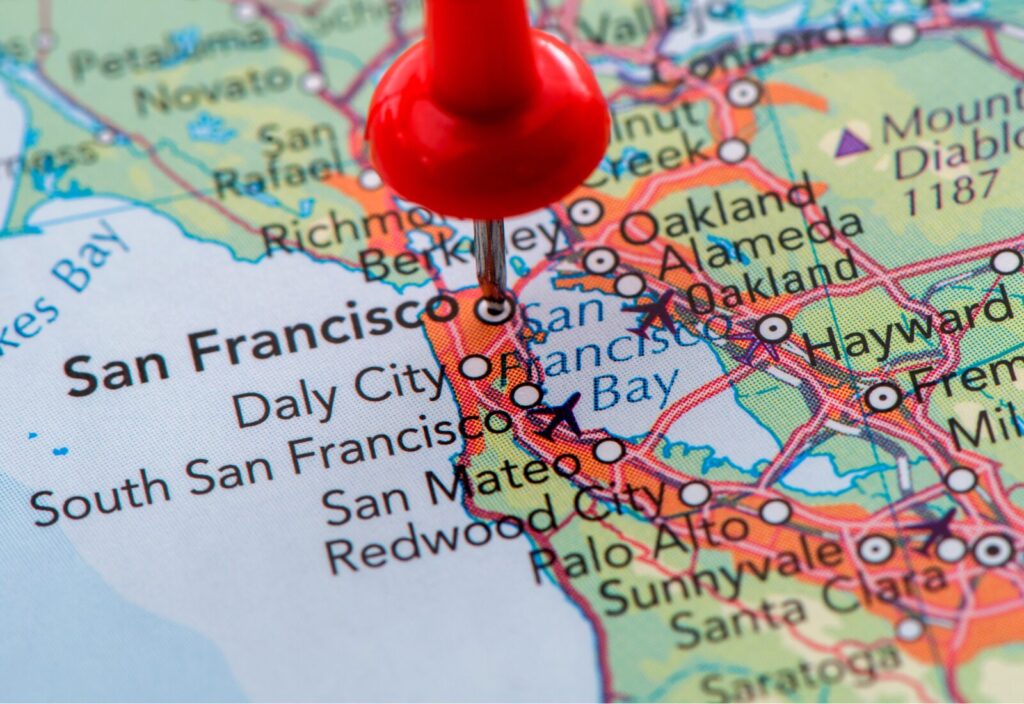San Francisco vs. Oakland: Trademark Battle Over Airport Name
San Francisco and Oakland are embroiled in a court dispute over the Oakland Airport’s plan to rename its airport “San Francisco Bay Oakland International Airport.” Without doubt, this’ll be an interesting case to watch, as the court determines whether Oakland’s actions constitute trademark infringement. It is sad though that the two airports are duking it out in court, instead of working together to advance the public interest.
The Facts: Trademarks and Airport Ownership
First, the facts. The City and County of San Francisco (“San Francisco”) registered the trademark SAN FRANCISCO INTERNATIONAL AIRPORT in 2012, and it alleges having used the trademark in connection to airport services since as far back as August 27, 1954. The trademark is used as the name of the airport owned by San Francisco (SFO), located some 14 miles south of its downtown, in San Mateo County.
Oakland’s Rationale for the Name Change
Across San Francisco Bay sits Metropolitan Oakland International Airport (OAK), located in the City of Oakland, and owned by the Port of Oakland. Recently, the Oakland Port’s board of commissioners voted to change OAK’s name. According to the board’s president, the name change will “boost inbound travelers’ geographic awareness of the airport by highlighting the airport’s location on the San Francisco Bay.” This suggests that the board is concerned that many travelers are unaware of Oakland’s location in the Bay Area, and hence fail to consider Oakland as an airport option.
San Francisco’s Objections and Lawsuit
San Francisco objects to the name change and it has filed a lawsuit in federal court alleging the Port of Oakland is engaging in trademark infringement and unfair competition. According to the Port of Oakland’s complaint, “consumers will very likely be confused about where [Oakland] airport is located,” potentially leading to a series of negative consequences:
Travelers will very likely be confused and book tickets to the unintended airport, thinking that the ‘San Francisco Bay Oakland International Airport’ is SFO and arrive in the wrong place, which would lead to missed flights and connections. Also, travelers may book travel to one airport, and mistakenly make reservations for rental cars at the other. Because the airports are about 30 miles apart, separated by the San Francisco Bay, arriving at the unintended airport would likely result in delays and entirely missed flights, as well as additional costs to get from one airport to the other should a traveler make such a mistake. These mistakes will cause frustration and financial loss for those travelers to the serious detriment of both airports, the region, and the consuming public.
San Francisco’s Trademark Protection Concerns
The scenarios raised by San Francisco are no doubt plausible. The complaint notes that Azores Airlines, which flies to OAK, is already using the new name, and it is not hard to imagine an Azorean passenger booking a flight to “San Francisco Bay Oakland International Airport” and assuming, incorrectly, that they will be arriving in SFO. If their final destination is in the Bay Area, that might not be a big deal, though it could certainly lead to inconveniences, for example, if they have a rental car waiting for them at SFO (which is probably not a good idea), have a hotel booked nearby, or friends greeting them. On the other hand, if the travelers have an onward flight from SFO booked on a separate reservation, the consequences could be more severe.
As a quick aside, (and contrary to what went viral on social media last week) there is no desk at the airport in Salzburg, Austria for dealing with travelers who accidentally end up in Austria when they intended to go to Australia. See NOT REAL NEWS: A look at what didn’t happen this week.
Even if passengers are aware that “San Francisco Bay Oakland International Airport” isn’t, in fact, SFO, there’s another concern from San Francisco’s point of view. As it explains in its complaint, consumers are likely to believe OAK’s airport services “are endorsed, approved, or sponsored by, or affiliated, connected, or associated with, [San Francisco], which they are not.” One of the purposes of trademark protection is to ensure that consumers do not confuse products, not only for the sake of the consumers, but also for that of the trademark owners, who might lose some of the goodwill associated with their goods and services if consumers mistakenly link them to inferior products.
We’re certainly not suggesting OAK is inferior to SFO, particularly considering that neither location is inherently more convenient (convenience will vary greatly depending on your destination in or near the Bay Area). Besides, considering some of the issues San Francisco faces these days, the possibility that a traveler might incorrectly assume that OAK is operated by San Francisco hardly seems like it should be a concern for the City by the Bay. Then again, San Francisco has a trademark to protect, and if it thinks Oakland’s move threatens that, trademark law provides remedies.
And so, San Francisco has gone to court, presumably with taxpayers footing the bill in one way or another.
A Case for Collaboration Over Litigation
Would it not have been better for the two airports to reach an agreement that allowed both San Francisco and Oakland to draw on the firepower of the San Francisco name? Based on recent visits to the two airports, they seem quite complementary. OAK is more than anything a Southwest Airlines base, with a smattering of international flights and almost no service by other big U.S. airlines. SFO has plenty of international flights and it serves as United Airlines’ West Coast hub.
Though some passengers will opt for either SFO or OAK based purely on their respective locations, the airports could team up to service other segments of the market. International passengers arriving in SFO, for example, would benefit from easier access to OAK’s larger offering of low-cost domestic flights. And from the looks of it, it wouldn’t be such a bad thing if some SFO flights went to OAK. The airports could work on enhancing connectivity by establishing ferry and express bus services between them.
By way of comparison, consider the situation in Phoenix. The City of Phoenix owns the better-known Phoenix Sky Harbor International Airport (PHX), but it is also one of the local governments that operates the Phoenix-Mesa Gateway Airport (AZA). Phoenix and Mesa are around 20 miles apart, compared to just over 12 miles in the case of San Francisco and Oakland. The City of Dallas owns Dallas Love Field (DAL), while co-owning Dallas Fort Worth International Airport (DFW) with — you guessed it — the City of Fort Worth.
What do you think? Is San Francisco’s trademark infringement lawsuit against Oakland the way to go? Or should these two cities instead seek trademark coexistence (and transport integration)?

























